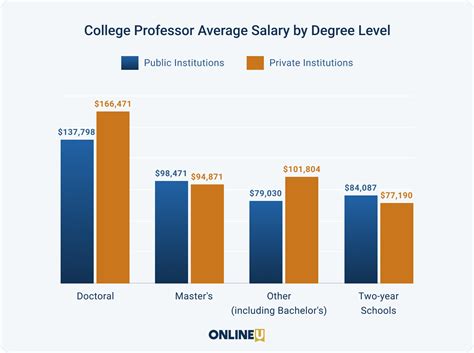Tenured professors are among the highest-paid professionals in academia. Their salaries vary depending on their rank, experience, and institution. However, they can generally expect to earn a comfortable living.

Average Salary
According to the American Association of University Professors (AAUP), the average salary for a tenured professor in the United States is $104,380. However, this number can vary significantly depending on the professor’s field of study, rank, and institution.
Assistant professors earn an average of $86,280, while associate professors earn an average of $99,170. Full professors earn an average of $123,970.
Salary by Field of Study
The salary of a tenured professor can also vary depending on their field of study. According to the AAUP, the highest-paid professors are in the fields of medicine, law, and business. The lowest-paid professors are in the fields of education, social sciences, and humanities.
Salary by Rank
The salary of a tenured professor also increases with their rank. Assistant professors are the lowest-paid tenured professors, while full professors are the highest-paid.
Salary by Institution
The salary of a tenured professor can also vary depending on the institution where they work. Professors at private institutions generally earn more than professors at public institutions.
Benefits
In addition to their salary, tenured professors also receive a number of benefits, including:
- Health insurance
- Dental insurance
- Vision insurance
- Retirement benefits
- Paid time off
How to Become a Tenured Professor
To become a tenured professor, you must first earn a doctorate degree. Once you have a doctorate degree, you must apply for a tenure-track position at a university. If you are hired for a tenure-track position, you will have a probationary period of five to seven years. During this time, you will be evaluated on your teaching, research, and service. If you are successful during your probationary period, you will be granted tenure.
Conclusion
Tenured professors are highly respected and well-paid professionals. If you are interested in a career in academia, you should consider pursuing a tenure-track position.
Tables
Table 1: Average Salary by Rank
| Rank | Average Salary |
|---|---|
| Assistant Professor | $86,280 |
| Associate Professor | $99,170 |
| Full Professor | $123,970 |
Table 2: Salary by Field of Study
| Field of Study | Average Salary |
|---|---|
| Medicine | $150,000 |
| Law | $130,000 |
| Business | $120,000 |
| Education | $80,000 |
| Social Sciences | $75,000 |
| Humanities | $70,000 |
Table 3: Salary by Institution
| Institution Type | Average Salary |
|---|---|
| Private | $110,000 |
| Public | $90,000 |
Table 4: Benefits
| Benefit | Description |
|---|---|
| Health insurance | Covers medical, dental, and vision expenses |
| Retirement benefits | Provides a pension and other retirement savings options |
| Paid time off | Includes vacation, sick leave, and personal days |
| Service | Allows professors to participate in university governance and other activities |
Effective Strategies
- Network with other professors. This can help you learn about tenure-track positions and get your foot in the door.
- Get involved in research. Research is an important part of a tenure-track position. Start publishing your work in academic journals as early as possible.
- Teach well. Teaching is another important part of a tenure-track position. Make sure that you are a good teacher and that your students enjoy your classes.
- Be a good colleague. Be respectful and supportive of your colleagues. This will help you build a positive working environment.
Tips and Tricks
- Start saving for retirement early. Retirement benefits are an important part of a tenured professor’s compensation. Start saving for retirement as early as possible to ensure a comfortable retirement.
- Take advantage of professional development opportunities. Universities offer a variety of professional development opportunities, such as workshops, conferences, and seminars. Take advantage of these opportunities to learn new skills and advance your career.
- Get involved in the community. Tenured professors are often involved in the community. This can help you build relationships with potential donors and supporters.
Common Mistakes to Avoid
- Don’t be afraid to ask for help. If you need help with your teaching, research, or service, don’t be afraid to ask for help from your colleagues or administrators.
- Don’t overwork yourself. It is important to have a good work-life balance. Don’t overwork yourself to the point of burnout.
- Don’t be discouraged by rejection. It is common for tenure-track candidates to be rejected for positions. Don’t be discouraged by rejection. Keep applying for positions and eventually you will be successful.
